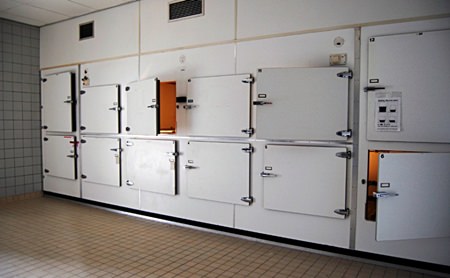To try to combat the carnage on the country’s roads during the annual weeklong traditional New Year’s holiday celebration, Thai authorities are going gory: Drunk drivers and repeat traffic offenders may be sent to work in hospital morgues to see the fruits of their irresponsibility.
The Songkran holiday puts untold thousands of Thais on the road, returning to their home villages from the big cities to reunite with families and cut loose, with alcohol usually fueling the festivities. Much of the joyriding takes place on motorbikes, with little observance of helmet laws. The government’s safety campaign appropriately calls the period — during which it is estimated 2.3 people die and 160 are injured every hour — “The Seven Days of Danger.”
 Drunk drivers and repeat traffic offenders may be sent to work in hospital morgues (Pic via Wikimedia Commons.)
Drunk drivers and repeat traffic offenders may be sent to work in hospital morgues (Pic via Wikimedia Commons.)
Casual attitudes toward road safety give Thailand the second worst record in the world for traffic fatalities, and health and safety experts fear the situation may be getting worse. The government, which earlier this year said drunk drivers could have their cars impounded for the duration of the holiday, last week approved the morgue shock treatment plan.
“Traffic offenders who are found guilty by courts will be sent to do public service work at morgues in hospitals,” said Police Col. Kriangdej Jantarawong, deputy director of the Special Task Planning Division. “It is a strategy used to make traffic offenders afraid of driving recklessly and driving while they are drunk because they could end up in the same condition. It is aimed to be a deterrent, a way to discourage people.”
Anurak Amornpetchsathaporn, director of the emergency response for the Bureau of Public Health, said Monday that a stint of working in hospital morgues may bring home the problem to reckless drivers in a way that community service such as tidying up parks and libraries has failed to do.
“They should see the actual physical and mental damage,” he said. “In the morgue, they will have to be cleaning up and transporting bodies, so that hopefully they would feel the pain, so that they may understand and attain a good conscience, so that it could be safer on the roads.”




